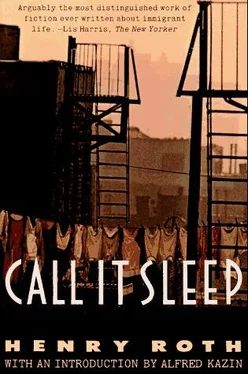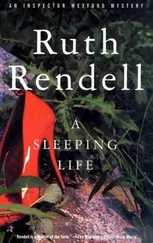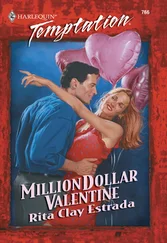“Are you mad?” she shrieked. “Let Italian cut-throats stab him to death, not you!” And redoubling her efforts, she hauled him into the store.
Left master of the field, the street cleaner still growling and gnashing his teeth snatched up the shovel and glaring at the retreating boys hacked fiercely at the piled heap before him. David, who had been watching from the curb, decided it would be better to withdraw — especially since he still had the wooden spoon in his hand.
But what to do with the spoon now? One had to burn it or one would sin. And one couldn’t burn it now because the sweeper was there. One could wait of course, and then when the sweeper was gone, build a little fire. But that wasn’t altogether pleasing either. He’d have to stay right here and wait till the man had left. He couldn’t go anywhere — not with a big wooden spoon in your pocket. He’d lose it maybe, and that would be a sin. And anyway, its mere presence hobbled the free mind. Nor did he like starting a fire by himself — the policeman might not understand. And the street cleaner might even come back.
Where could he go? Where find another fire? Another block maybe? But maybe they wouldn’t let him throw it in. They’d want a penny too. Some crust! Maybe he could sneak up to a fire if he found one, and throw it in. No, they’d throw it away— No. But he’d have to burn it or get a sin. Where go?
He had already been walking aimlessly toward Avenue D, and now at the corner, he stopped and gazed vacantly about him. Seventh Street … Eighth Street … The River … The River! There! Nobody was there. He wanted to go there anyhow. He could make a little fire — a tiny fire in front of the junk-yard and watch it. Yes, there! The matches? Yes, he had four. He’d get there quick and light it, and then sit down on the dock. That was it.
Elated at having found a solution, he crossed Avenue D, passed the tenements; loitered a moment beside the open door of the smithy. Inside stood the shadowy and submissive horse, the shadowy smith. Acrid odor of seared hooves lingered about the place. Now a horse-shoe glowed under the hammer — ong-jonga-ong-jong-jong-jong — ringing on the anvil as the pincers turned it.
— Zwank. Zwank. In a cellar is—
He passed the seltzer bottlery — the rattle and gurgle — passed the stable. Out of the dark manure-smell into the sunlight, the Negro stable-boy came out on patent leather shoes, holes cut for bunions. He was laughing — strong teeth and head thrown back — and his laughter, sleeve within larger sleeve of mirth, opened like a telescope, rich, warm, contagious. David grinned as he went by. Grey sparrows by puddles, pecked at the yellow oats among the cobbles, among the cobbles miraculous blades of grass. And there, just before the shore sank beneath the mossy piles of the dock (these driven through blackened rocks, past oil-barrels, stove-in, moss-green and rusty, past scummy wreckage) he squatted down beside a ledge of the open junk-heap, the salt-stink of ebbtide in his nostrils.
— Right here on the cobbles could. Nobody here, nobody watching. Get little pieces — there’s a big one — paper. Catch before it flies. It cracks, big piece. Long tear. Another. That boy in the toilet. Bet he had a sin. This way tear. Little pieces. He’s watchin’ I bet. God. Always. Little, little sticks. Grass over here between. Who puts grass here? Won’t burn. And the Italian got a sin. Like the boy said. But I bet the butcher had a bigger knife. Cardboard, good too. Wonder can He see I’m being good? It’s like a tent. Now stay on top, chumitz. Now wait.
He fetched out one of his matches, scraped it against a cobble and shielding its flame touched it to the bits of paper under the kindling. A live, golden flame awoke; wood and cardboard caught, and in a few minutes the whole tindery mound was ablaze. Content yet strangely nostalgic, he crouched down beside the fire and watched the first tiny beads of flame run up the raveled threads of the rag that bound feather and spoon together. The blue, merging smoke crossed his nostrils—
— Gee, how feathers stink! No, they don’t! It’s holy and He’s looking. Feathers don’t stink! No!
The cloth burned rapidly; feathers and spoon sank into the shifting embers, separated; the half-charred crumbs spilled out and were consumed.
— No more chumitz. All burned black. See God, I was good? Now only white Matzohs are left. Can go. Don’t sit on the edge of the dock, mama says. It frightens her. It don’t frighten me. Just once, for a tiny little while. Was good, wasn’t I?
A few steps toward the river, the cobbles gave place to the broad wooden slabs of the wharf. On one side a paint-blistered boat rotted vacantly on the water, on the other side an empty scow tugged at its yellow hawsers and grunted against the dock. On a pier, two blocks away, the black jaws of a steam-scuttle, yawning, dove into the hold of a coal-barge, and dripping, swung back to the huge bins. When he had come almost to the end of the dock, he sat down, and with his feet hanging over the water leaned against the horned and bulbous stanchion to which boats were moored. Out here the wind was fresher. The uncommon quiet excited him. Beneath him and under his palms, the dry, splintering timbers radiated warmth. And beneath them, secret, unseen, and always faintly sinister, the tireless lipping of water among the piles. Before him, the river and to the right, the long, grey bridges spanning it—
— Like that sword with the big middle on Mecca cigarettes.
That clipped the plumes of a long ship steaming beneath it. Gulls, beaked faces ugly as their flight was graceful, wheeled through the wide air on sickle wings. A tug on the other side pecked spryly at a stolid barge. Yoked at length to its sluggish mate, it puffed briskly out into the river, gathered momentum.
— Makes the fat one make a mustache when he goes.
The sunlit rhythmic spray sprouted up before the blunt bow of the barge, hung whitely, lapsed.
— Bricks on it. Bet a whole house.
A cloud sheared the sunlight from the wharf; his back felt cooler; the wind sharpened … Smokestacks on the other bank darkened slowly, fluting filmy distance with iron-grey shadow.
— Like forks they stick up. Like for — Fu— Sh! Was good today. Look other place.
His gaze shifted to the left. As the cloud began to pass, a long slim lath of sunlight burned silver on the water—
— Gee, didn’t see before!
Widened to a swath, a lane, widened.
— Like a ship just went.
A plain, flawless, sheer as foil to the serried margins. His eyes dazzled.
— Fire on the water. White.
His lids grew heavy.
— In the water she said. White. Brighter than day. Whiter. And He was.
Minutes passed while he stared. The brilliance was hypnotic. He could not take his eyes away. His spirit yielded, melted into light. In the molten sheen memories and objects overlapped. Smokestacks fused to palings flickering in silence by. Pale laths grew grey, turned dusky, contracted and in the swimming dimness, he saw sparse teeth that gnawed upon a lip; and ladders on the ground turned into hasty fingers pressing on a thigh and again smokestacks. Straight in air they stood a moment, only to fall on silvered cardboard coruscating brilliance. And he heard the rubbing on a wash-board and the splashing suds, smelled again the acrid soap and a voice speaking words that opened like the bands of a burnished silver accordion — Brighter than day … Brighter … Sin melted into light …
Uh chug chug, ug chug!
— Cucka cucka … Is a chicken …
Uh chug ug ch ch ch — Tew weet!
— No … Can’t be …
Ug chug, ug chug, ug — TEW WEET!
What! He started as if out of a dream. A tremor shook him from head to foot so violently that his ears whirred and rang. His eyes bulged, staring. What? Water! Down below! He flung himself back against the mooring post.
Читать дальше












